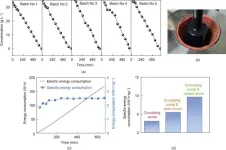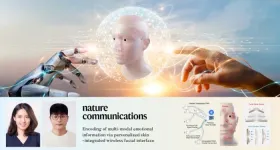(Press-News.org) Over 134,000 cancer cases went undiagnosed in the U.S. during the first 10 months of the COVID-19 pandemic, according to a new University of Kentucky Markey Cancer Center study.
The report published in JAMA Oncology Feb. 22 provides the first estimates of missed cancer diagnoses in 2020 using nationwide surveillance data.
Researchers have expected impacts to cancer detection as a result of delayed screenings and missed health care appointments due to the COVID-19 pandemic, but the extent of this impact had not been quantified until recently. The study’s findings foreshadow even greater consequences.
“The longer cancer exists undetected, the lower the chances of positive patient outcomes. Every missed detection is a lost opportunity to beat cancer at its most treatable stage,” said the paper’s senior author Krystle Lang Kuhs, Ph.D., co-leader of the UK Markey Cancer Center’s Cancer Prevention and Control Research Program and associate professor in the UK College of Public Health. “This research reminds us to prioritize our health and get back on track with recommended cancer screenings and routine office visits so we can live longer, healthier lives.”
Findings from this report will help to inform where the U.S. health care system can make up ground in cancer screening and detection and give insight on how similar disruptions could impact cancer diagnoses in the future.
The research underscores the importance of timely dissemination of data, says Todd Burus, the study’s lead author and part of Markey Cancer Center’s Community Impact Office.
"It is unfortunate that we are only able to perform this assessment over two years after the fact,” said Burus. “We must invest the resources necessary to have more timely tracking of trends in cancer incidence so that we can target responses to the places they're needed sooner."
The study relied on data from the U.S. Cancer Statistics Public Use Database June 2023 release—the first release available with 2020 cancer incidence data for all 50 states. Using trends from previous years, the team calculated the expected cancer rates for March through December 2020 and compared this with what was actually reported.
Results showed that overall cancer diagnoses were 13% lower than expected during those 10 months, including a 28.6% reduction from expected during the period of widespread stay-at-home orders in March to May 2020.
Researchers also examined incidence rates by cancer type and stage of diagnosis, and among different populations. Key findings include:
Prostate, female breast, and lung cancers had the largest numbers of potentially missed cases during the 10-month period at 22,950 cases, 16,870 cases and 16,333 cases, respectively.
Cancers with recommended, high-evidence screenings (female breast, cervical, colorectal and lung) saw a total rate reduction of 13.9% versus expected. Rates of female breast cancer showed signs of recovery to previous trends following the first three months of the pandemic, but levels remained suppressed for cervical, colorectal and lung cancers throughout the 10 month period.
Significant reductions occurred among both early and late-stage diagnoses of most cancer sites examined.
States that implemented stay-at-home orders in excess of six weeks saw a greater disruption to cancer diagnoses than those that undertook less restrictive measures, particularly among lung, kidney and pancreatic cancers.
The paper’s authors also stress the need to continue following this data in the coming years to understand how undetected cases from 2020 impact future trends in cancer mortality and survival.
“There will undoubtedly—and unfortunately—be a subsequent bump in cancer mortality,” the authors note. “How much, and for how long, will provide a more complete picture of the consequences of COVID disruptions on the burden of cancer in the U.S.”
END
Markey study reveals extent of undiagnosed cancer cases due to COVID-19 pandemic
2024-02-22
ELSE PRESS RELEASES FROM THIS DATE:
NextGen Precision Health researchers uncover potential treatment for cardiovascular complications from type 2 diabetes
2024-02-22
New research at the Roy Blunt NextGen Precision Health building has discovered a potential treatment for an underlying cause of cardiovascular disease in people with Type 2 diabetes.
More than 30 million Americans live with Type 2 diabetes. One common feature of diabetes is the hardening and inflexibility of blood vessels caused by damage to the endothelial cells in the vascular system. Over time, this can lead to the development and progression of cardiovascular disease, which is the number one cause of death in diabetics. Because endothelial dysfunction is causally linked to cardiovascular disease, there is a considerable ...
Immune cell receptor provides promising immunotherapy target
2024-02-22
FOR IMMEDIATE RELEASE
Drugs that target a receptor on immune cells called activin receptor 1C may combat tumor-induced immune suppression and help patients’ immune systems fight back against cancer, according to a study by investigators at the Johns Hopkins Kimmel Cancer Center and its Bloomberg~Kimmel Institute for Cancer Immunotherapy.
The study, published online Jan. 8 in Oncoimmunology, identifies a new strategy cancer cells use to protect themselves from immune system attack, and suggests treatments that could counteract it. It shows that tumor cells and some immune cells produce proteins called activins that ...
Silicon microresonators for artificial neural networks
2024-02-22
Researchers have made significant progress in the development of artificial neural networks using tiny silicon devices called microresonators, paving the way for faster and more energy-efficient artificial intelligence systems. These networks mimic the computing capabilities of the human brain, breaking away from traditional digital computer architectures and leveraging the speed, low power dissipation and multi-wavelength capabilities of photonics.
A review article describing the implementations of neural networks using silicon microresonators was published Jan. 16 in Intelligent Computing, a Science Partner Journal.
Silicon microresonators ...
Scientists develop a simple blood test to quickly diagnose sarcoidosis
2024-02-22
Scientists develop a simple blood test to quickly diagnose sarcoidosis
NIH-funded tool can accurately identify the potentially life-threatening inflammatory disease
A research project supported by the National Institutes of Health has developed a tool to rapidly and inexpensively diagnose sarcoidosis, a chronic inflammatory disease marked by the growth of tiny lumps called granulomas in the lungs and other organs in the body. The tool, which uses a simple blood test, could allow for selective use of more invasive diagnostic tests often used to identify the ...
New electrochemical system enables efficient metal recovery from industrial wastewater
2024-02-22
A research team at Tsinghua University led by Professor Huijuan Liu has developed a new electrochemical system that promises to revolutionize metal recovery from industrial wastewater. The research was published in Engineering.
Industrial wastewater poses significant environmental hazards due to heavy metal pollution. Current methods for metal recovery, such as electrodeposition, suffer from interfacial ion transport limitations, resulting in slow and low-quality recovery. In their study, the team proposed a novel approach that integrates a transient electric field (TE) and swirling flow (SF) to improve mass transfer and promote interfacial ...
Non-solvating electrolytes enhance performance of organic electrode-based batteries
2024-02-22
In a groundbreaking study, Professor Won-Jin Kwak in the School of Energy and Chemical Engineering at UNIST, in collaboration with researchers from Hanyang University, have pioneered a method to significantly enhance the performance and lifespan of organic electrode-based batteries. The findings promise to accelerate the commercialization of eco-friendly batteries and pave the way for further advancements in the field.
Organic electrodes have long been recognized for their cost-effectiveness and natural abundance, making them a promising alternative to traditional lithium-ion battery ...
NIFTY® DNBSEQ-G99 platform receives CE-IVDD certification and advances prenatal care standards
2024-02-22
BGI Europe A/S, a wholly owned subsidiary of BGI Genomics, announced its NIFTY® non-invasive prenatal testing kit and software (CE-IVDD List B) were granted an extension under its existing CE-IVDD certification to include the DNBSEQ-G99 model to meet the European Union regulations for medical devices.
In January 2024, BGI Genomics unveiled the NIFTY® ultra-fast non-invasive prenatal genetic testing product, utilizing the innovative DNBSEQ-G99 platform. Designed for both small and medium throughput, this platform ensures top-notch testing ...
Living in violent neighborhoods affects children's brain development
2024-02-22
Living in neighborhoods with high levels of violence can affect children’s development by changing the way that a part of the brain detects and responds to potential threats, potentially leading to poorer mental health and other negative outcomes, according to research published by the American Psychological Association.
However, nurturing parents can help protect kids against these detrimental effects, according to the study, published in the journal Developmental Psychology.
“Decades of research ...
World’s first real-time wearable human emotion recognition technology developed!
2024-02-22
A groundbreaking technology that can recognize human emotions in real time has been developed by Professor Jiyun Kim and his research team in the Department of Material Science and Engineering at UNIST. This innovative technology is poised to revolutionize various industries, including next-generation wearable systems that provide services based on emotions.
Understanding and accurately extracting emotional information has long been a challenge due to the abstract and ambiguous nature of human affects such as emotions, ...
MD Anderson acquires inducible switch technologies for cell therapy
2024-02-22
HOUSTON ― The University of Texas MD Anderson Cancer Center today announced it has acquired certain assets from Bellicum Pharmaceuticals, Inc. related to the CaspaCIDe® switch platform and the GoCAR® platform. The transaction also includes clinical-grade stocks of rimiducid, an agent used to trigger the switches.
As a result of this acquisition, MD Anderson may incorporate these platforms into its own cell therapy programs. The institution also intends to make the technology ...



